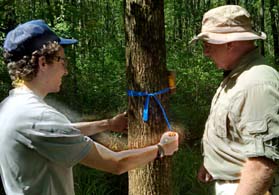For Immediate Release: October 8, 2015
Contact: Lynne Richmond
(609) 633-2954
lynne.richmond@ag.state.nj.us
(TRENTON) – New Jersey Department of Agriculture officials today reported the emerald ash borer (EAB), an invasive beetle that attacks and kills ash trees, is active in 14 towns in six counties.
A trapping program in 82 towns over the summer and reporting from homeowners has resulted in the discovery to date of the beetle in Hillsdale, Bergen County; Edgewater Park and Westampton, Burlington County; Ewing, Hamilton Township, Hopewell, Princeton, West Windsor., Mercer County; Monroe and South Brunswick, Middlesex County; Bridgewater, Franklin Townshipand Hillsborough, Somerset County; and Allentown, Monmouth County.
“Just as emerald ash borer has swiftly spread through other states in the nation, it has now moved to New Jersey and we must prepare for the impact of this highly destructive invasive pest, which could lead to the death of ash trees,” said New Jersey Secretary of Agriculture Douglas H. Fisher. “We ask that towns and counties act now to put plans in place to respond to the beetle.”
In an effort to protect the state’s ash trees, the Department of Agriculture initiated the field release this fall of biocontrol parasitoids for emerald ash borer in four locations in Bridgewater, Hillsborough, Franklin and Ewing Townships. Releases of almost 9,000 larval and 1,600 egg EAB parasitoids were made in wooded ash sites containing low levels of EAB in September in an effort to help suppress building EAB populations. The beneficial insects were supplied by the U.S. Department of Agriculture’s EAB Biocontrol Laboratory in Brighton, Michigan.
Municipal officials and residents of those towns and counties are encouraged to visit the New Jersey Emerald Ash Borer website www.emeraldashborer.nj.gov where they can find resources on how to protect their ash trees or what to do with dead or dying trees.
Emerald ash borer was first discovered in New Jersey in May 2014 by a private citizen in Bridgewater. EAB is now present in 25 U.S. states and two Canadian provinces. It was first discovered in Michigan in 2002 and has since killed tens of millions of trees.
The adult emerald ash borer is a metallic green insect about one-half inch long and one-eighth inch wide making it hard to detect in the wild. The female beetles lay eggs on the bark of ash trees. The eggs hatch and the larvae bore into the bark to the fluid-conducting vessels underneath. The larvae feed and develop, cutting off the flow of nutrients and, eventually killing the tree. EAB attacks and kills North American species of true ash, and tree death occurs three to five years following initial infestation. EAB is native to Asia.
The New Jersey Emerald Ash Borer website, developed by the New Jersey Emerald Ash Borer Task Force, made up of representatives of the NJDA, NJ Department of Environmental Protection, Rutgers University, and U.S. Department of Agriculture, has many resources for municipal officials, woodland owners and residents. The site explains the signs of the beetle, how to identify ash trees, how to report a possible infestation, and what to do with dead or removed trees. For towns, there is an Emerald Ash Borer Management Plan template and a tree removal cost calculator. For homeowners, there is a risk map and treatment options. For woodland owners, there is a list of companies that will accept ash.
New Jersey is part of a federal quarantine to prevent the spread of the beetle, which prohibits movement of ash trees outside of the quarantine zone. The Department also recommends not moving firewood. Firewood is a vehicle for movement of tree-killing forest pests including EAB. Use locally-sourced firewood when burning it at home and when travelling, burn firewood where you buy it. Make sure to burn all wood purchased.
Report signs of the beetle to the Department of Agriculture at 609-406-6939.
For more information about Emerald Ash Borer, visit www.emeraldashborer.nj.gov.
|
|||||||||||||
TREE-KILLING EMERALD ASH BORER SPREADS TO SIX NJ COUNTIES
Towns Encouraged to Plan for Beetle’s Impact



